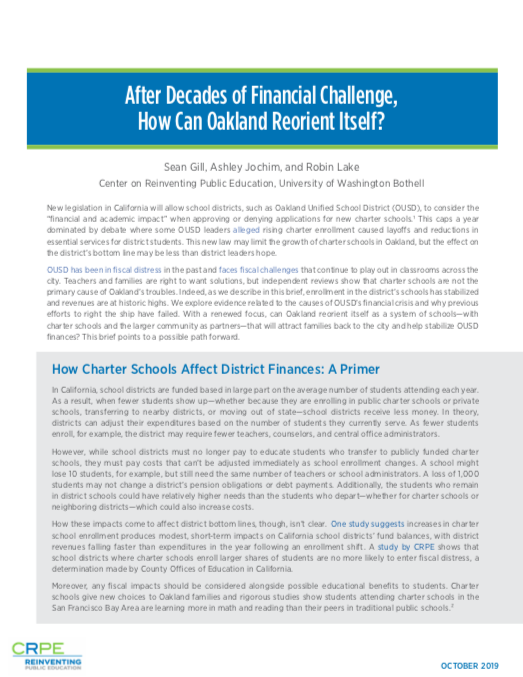New legislation in California will allow school districts, such as Oakland Unified School District (OUSD), to consider the “financial and academic impact” when approving or denying applications for new charter schools. This caps a year dominated by debate where some OUSD leaders alleged rising charter enrollment caused layoffs and reductions in essential services for district students. This new law may limit the growth of charter schools in Oakland, but the effect on the district’s bottom line may be less than district leaders hope.
OUSD has been in fiscal distress in the past and faces fiscal challenges that continue to play out in classrooms across the city. Teachers and families are right to want solutions, but independent reviews show that charter schools are not the primary cause of Oakland’s troubles.
In this brief, we explore evidence related to the causes of OUSD’s financial crisis and why previous efforts to right the ship have failed. With a renewed focus, can Oakland reorient itself as a system of schools—with charter schools and the larger community as partners—that will attract families back to the city and help stabilize OUSD finances? This brief points to a possible path forward.
We make the following recommendations for OUSD:
- The board should embrace financial reform to rebuild community confidence.
- Engage school communities to ensure central office spending is focused on high-value services.
- School closures or consolidations must be carefully planned to minimize disruption and achieve savings.
- Rethink school staffing models to preserve small, valued campuses.
- Explore new partnerships to encourage educators to innovate and develop quality schools.
- The district, the charter sector, and the city should collaborate on a master education facilities plan to ensure all students have modern and suitable learning environments.
- The district and the charter sector must collaborate more closely on students with special learning needs to address cost concerns and improve equity for all students.






